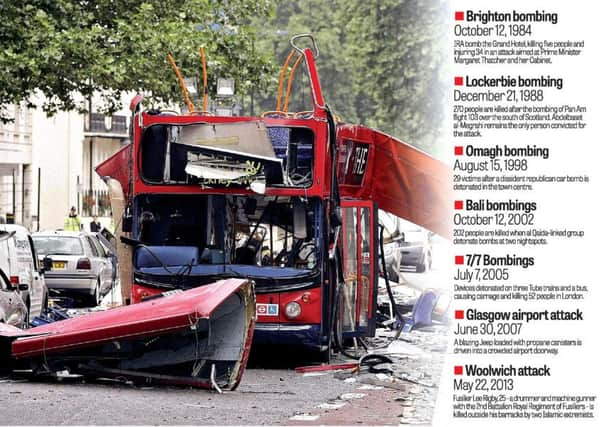Nick Baines: Inspiration to defeat lure of terrorism 10 years after 7/7 bombings


I was in my office in Croydon when a friend phoned to say she couldn’t meet me in the capital later because “London is closed”.
She said the train from Leicester had been stopped at Peterborough and turned around. Passengers had been told that a power surge had shut the entire rail network.
Advertisement
Hide AdAdvertisement
Hide AdIt wasn’t long before the shocking news began to drip through that in fact there had been four suicide bombings and the casualty numbers were going to be high.
Within an hour, all the buildings around the station had been evacuated and the station cordoned off. Fear of further attacks was palpable.
The next morning I was due to be at meetings in central London. There was a lot of questioning about whether it was safe to use public transport or venture into town at all.
I was clear that (a) you can’t let terrorists win by giving them what they want, and (b) life must carry on.
So, I went.
Advertisement
Hide AdAdvertisement
Hide AdTwo weeks later there was a second attempted attack, but it failed.
On a visit to Belmarsh Prison, later that year I met the alleged terrorists and had a conversation with them about scriptures.
As we discovered very quickly, three of the 7/7 bombers came from West Yorkshire, and questions began to be raised about what it was about this part of the world that made young people capable and willing to commit such atrocities.
Of course, the religious motivation behind these murderous actions soon became the focus of media speculation and the satellite vans descended on Leeds and its environs.
Advertisement
Hide AdAdvertisement
Hide AdThe 10 years since those appalling events have been both encouraging and discouraging.
Whatever the (often simplistic) public debates about radicalisation or ghettoisation in West Yorkshire, much significant positive work has gone on under the media radar.
Relationships between Christians, Muslims, Jews and others have been worked at on the ground in order that they are strong and supportive when the crises come.
When Muslims feel scapegoated by wider society in the wake of some Islamist atrocity somewhere else, it is often those of other faiths who maintain the friendship and keep the communications open.
Advertisement
Hide AdAdvertisement
Hide AdAlthough some local authorities are locked into a narrow conceptual preoccupation with “community cohesion”, they often facilitate and encourage serious initiatives that bring people together and break down barriers.
There are numerous examples of mutual care and compassion in our communities as well as honest debate and discussion about the hard issues: why some young people reject “normality” and have their head and heart turned by exclusive and violent ideology; how doctrinal teaching can breed in young people the seeds of hatred; how the isolation of ghettoised communities can be countered and schools become places of encounter with difference.
The last decade has taught us that communities finding themselves under media scrutiny naturally turn in on themselves in pre-emptive self-defence. Muslims fear being scapegoated for the sins of the fanatics, and they resent the ignorance of outside commentators who find basic distinctions such as “ethnic” and “religious” too difficult to comprehend.
Clearly, radicalisation has its roots not just in religion, but in poverty, ideology and politics. (The Arab Spring turned into a nightmare ignited by responses to the chaos left behind by Western invasions and occupations).
Advertisement
Hide AdAdvertisement
Hide AdHowever, what has been particularly interesting about the Western response to radicalisation and the cases of individuals and entire families disappearing to join so-called Islamic State is its bewilderment.
We are told that we need to educate our Muslim young people better so that they know how appalling are life conditions under IS – that they will be subject to a brutal religious ideology that might involve them in violence and suffering.
Of course, many of those who have left the relative comfort of “home” in the UK are extremely well-educated and fully cognisant of what they are heading off to.
Education is not the issue. Information is not lacking. What perhaps is lacking is inspiration to see life and death here as in any way valuable or attractive.
Advertisement
Hide AdAdvertisement
Hide AdI don’t say this lightly, and I certainly don’t say it in defence of Islamic maniacs who are prepared to do unspeakable things to innocent men, women and children. But, if we are to begin to understand what attracts then drives (mainly) young men and women to leave behind a life of humdrum security for a (perhaps short) life of action, we must ask this question: how do we offer our disillusioned young people an alternative world view and lifestyle that captures the imagination, fires up vision and inspires self-sacrifice (in a non-mortal sense)?
In one sense, none of this is new. Young people are always – and always have been – susceptible to alternative inspirations. But, our question in 2015 has to do with how we inspire young people to see value beyond celebrity and consumerism in a world short on vision and long on entertainment?
We need to continue to work in schools and places of worship to enable integration in a multi-cultural and multi-faith and multi-ethnic society.
We also face an urgent need to offer real opportunities to elements of this society who – rightly or wrongly – feel disenfranchised, disempowered and disillusioned. But education won’t do this alone; we need to inspire.
And that is a much harder task.
Nick Baines is Bishop of Leeds in the Diocese of West Yorkshire and the Dales.